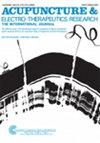Acupuncture Treatment for Insomnia and its Effect on Serum TNF-α, IL-6, and IL-1β levels
IF 0.4
4区 医学
Q4 INTEGRATIVE & COMPLEMENTARY MEDICINE
Acupuncture & Electro-Therapeutics Research
Pub Date : 2021-01-01
DOI:10.3727/036012921x16287835103453
引用次数: 1
Abstract
The incidence of insomnia is increasing, and acupuncture is known to have a favorable therapeutic effect on insomnia, but its treatment mechanism is unclear. Patients with insomnia were recruited and randomly divided into an acupuncture treatment group and a control group using a single-blind, random number table. The Pittsburgh Sleep Quality Index (PSQI) score, Insomnia Severity Index (ISI) score, sleep-related parameters (SE, SA, and TST), and levels of inflammatory response factors IL-1β, IL-6, and TNF-α were analyzed. The baseline data of the two groups were not significantly different and were comparable. Acupuncture treatment significantly improved patient PSQI (P < 0.05) and ISI scores (P < 0.05), as well as SE, SA, and TST (P < 0.05). Levels of TNF-α and IL-1β were increased (all P < 0.05), while IL-6 levels were decreased (P < 0.05), lasting for at least 4 weeks. Acupuncture treatment can increase the serum levels of TNF-α and IL-1β, decrease IL-6 levels, and improve insomnia symptoms.针刺治疗失眠及其对血清TNF-α、IL-6、IL-1β水平的影响
失眠的发病率越来越高,针刺对失眠有良好的治疗效果,但其治疗机制尚不清楚。采用单盲随机数字表法,将失眠患者随机分为针灸治疗组和对照组。分析匹兹堡睡眠质量指数(PSQI)评分、失眠严重指数(ISI)评分、睡眠相关参数(SE、SA、TST)以及炎症反应因子IL-1β、IL-6、TNF-α水平。两组基线数据无显著差异,具有可比性。针刺治疗可显著改善患者PSQI (P < 0.05)、ISI评分(P < 0.05)及SE、SA、TST评分(P < 0.05)。TNF-α、IL-1β水平升高(P < 0.05), IL-6水平降低(P < 0.05),且持续4周以上。针刺治疗可提高血清TNF-α、IL-1β水平,降低IL-6水平,改善失眠症状。
本文章由计算机程序翻译,如有差异,请以英文原文为准。
求助全文
约1分钟内获得全文
求助全文
来源期刊

Acupuncture & Electro-Therapeutics Research
医学-全科医学与补充医学
CiteScore
0.50
自引率
66.70%
发文量
9
审稿时长
>12 weeks
期刊介绍:
The aim of the journal is to provide an international forum for the exchange of ideas and promotion of basic and clinical research in acupuncture, electro-therapeutics, and related fields. The journal was established in order to make acupuncture and electro-therapeutics a universally acceptable branch of medicine through multidisciplinary research based on scientific disciplines. The final goal is to provide a better understanding of both the beneficial and adverse effects of these treatments in order to supplement or improve existing methods of diagnosis, prognosis, treatment, and prevention of diseases in both Western and Oriental medicine.
 求助内容:
求助内容: 应助结果提醒方式:
应助结果提醒方式:


